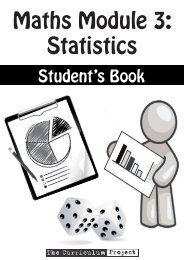Teacher's Guide - The Curriculum Project
Teacher's Guide - The Curriculum Project
Teacher's Guide - The Curriculum Project
- No tags were found...
You also want an ePaper? Increase the reach of your titles
YUMPU automatically turns print PDFs into web optimized ePapers that Google loves.
Production (cont’d)On Your Own1. Write the questions (but not the answers!) on the board. Give studentsabout 15-20 minutes to answer them in their notebooks. <strong>The</strong>n put them intopairs and ask them to compare answers. Do they agree? Finally, elicit answersfrom individual students and check agreement with the rest of the class.1. What is the main system of land ownership in Brazil?Answer:<strong>The</strong> main system of land ownership in Brazil is private ownership.2. How did MST start fighting for their land rights in 1985?Answer: <strong>The</strong>y started fighting for their land rights in 1985 by occupying a largeunused farm in the South of Brazil.3. What system of land ownership are MST using?Answer: MST are using the collective system of land ownership.4. What is sharecropping? Why are MST against it?Answer: Sharecropping is when landowners let farmers use their land, in returnfor a share of the crop. MST are against it because they say it only helps the richpeople and that the sharecroppers are almost like slaves.5. When MST occupy land, they call it ‘cutting the wire’. What do they mean?Answer: <strong>The</strong>y mean that they are changing the ownership of the land from privateto collective.DiscussionGroupwork2. Brainstorm the main kinds of land (natural resources) in the students’community. Write their answers on the board. For each one ask the studentswhether they are owned publicly, privately or collectively (the answer mightbe one or more of these). <strong>The</strong>n ask if they know about any problems aboutownership of these resources. Useful questions: Is it difficult for everyone to get accessto enough natural resources? Why/Why not? Who owns them?Are there any laws to controlaccess to natural resources? Are they good laws?3. Land reform in the community.Put the students into groups of 3-5 people.Give them 15-20 minutes (more if necessary) to think about these issues,write down their ideas, and make a presentation poster (if possible). <strong>The</strong>nask each group to present their ideas to the class. Try to ensure that everystudent in each group participates in the presentation. When all the groupshave finished, discuss which ideas the class thought were the best, and why.<strong>The</strong> Asian HighwayPre-teach: appropration (noun): to take something illegally and without payment.Pairwork4. True or false. Write the statements below on the board (but not theanswers!). In pairs, ask the students to decide if the following statementsare true or false. If they are false, they must provide a correct statement.1. <strong>The</strong> Asian Highway is supported by UNESCAP.Answer: True.2. UNESCAP is not helping Burma build their section of the Asian Highway.Answer: False. UNESCAP is seeking funding for three road improvement projects in Burma.3. Burma’s Asian Highway has not involved the appropration of land.Answer: False. <strong>The</strong> government appropriated rice fields in Thaton and Pa’an. This land wasused without the permission of the villages.<strong>The</strong> <strong>Curriculum</strong> <strong>Project</strong> ECONOMICS: an introduction - Teacher’s <strong>Guide</strong>32


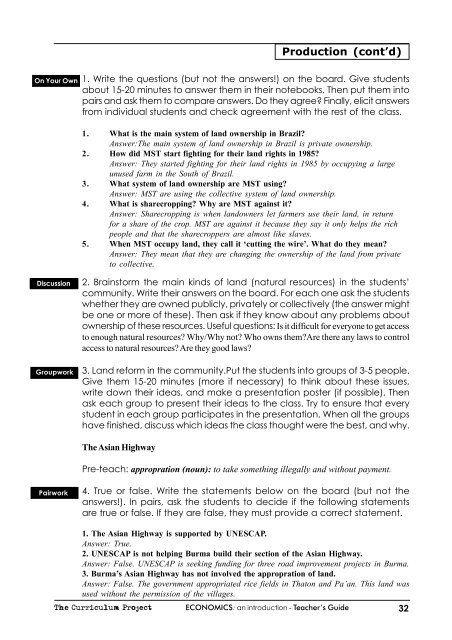
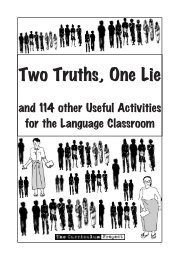
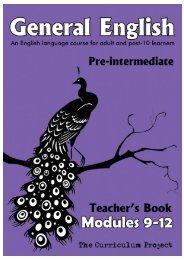
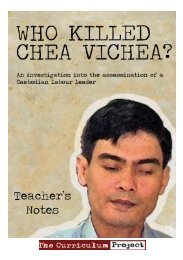
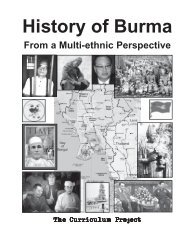


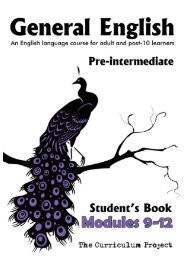

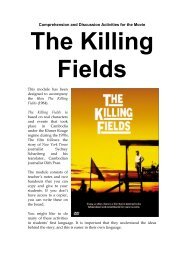
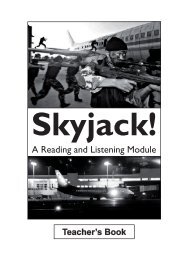
![[Eng] Nov 2012 DRAFT - The Curriculum Project](https://img.yumpu.com/45590859/1/184x260/eng-nov-2012-draft-the-curriculum-project.jpg?quality=85)


